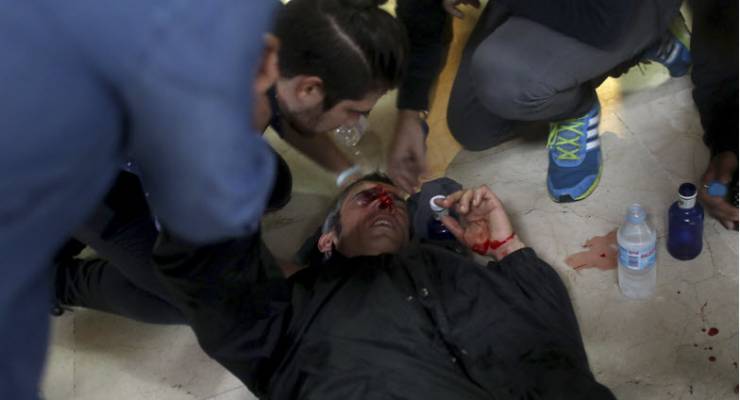
The overwhelming vote of Catalonia’s referendum in favour of independence yesterday was hardly surprising, nor was the violence that accompanied it as police tried to shut down voting. Not all Catalans want independence from Spain, so avoided the vote, leaving the field clear for independence supporters, while sovereign states are usually loath to see any part of their territory secede.
The push for Catalonian independence arose as a result of Spain’s constitutional court reinterpreting Catalonia’s autonomy provisions, previously agreed to by the national government, which had expanded the extent to which the province could be responsible for its own legal and financial affairs. The Spanish constitution is ambiguous on this point, noting that Spain’s regions can be autonomous, but also calling for national unity.
There was considerable anger at what many Catalans saw as a betrayal by the constitutional court in Madrid, given that the provinces of Navarre and the Basque country have such autonomy. Catalonia has also been the engine room for Spain’s still weak economy and, in effect, subsidises poorer parts of the country, which many Catalans resent.
But the desire for Catalonian independence goes much deeper than just a sense of recent political betrayal or economic cost. Catalonia also has a long history of its own politics, language and identity.
Its distinct political history can be traced to the eighth century and the region has had several periods of autonomy, as well as being at the forefront of Spain’s battles against outsiders and within Spain’s civil conflicts.
At the same time was Catalonia developing as Spain’s leading industrial hub in the late-19th century, it was also developing a renewed national identity and attendant radical politics, in particular its own brands of socialism and anarchism. In the early 20th century, Catalonia was twice recognised as a self-governing autonomous territory — and each time being forced back into the fold by authoritarian governments in Madrid.
[Rundle: Trump’s crusade against NFL part of a global unraveling]
In 1939, Catalonia succumbed to generalissimo Francisco Franco’s Falangists, in part due to its own in-fighting (which George Orwell described in Homage to Catalonia), with its language and cultural institutions being banned. Catalans suffered deeply under Franco and memories of this repression, too, drive a desire for separation.
In 1978, a few years after Franco’s death, Catalans voted to remain with Spain, but under an autonomous arrangement. Another referendum in 2006 extended Catalonia’s legal autonomy and recognised Catalonia as a “nation”. This was overturned in 2010 by Spain’s constitutional court, just as the global financial crisis crashed into the Spanish economy.
The overturning of the 2010 extension of autonomy prompted a referendum in 2014 in which 92% of Catalans voted for the province to become a state and 80% voted for independence. This referendum, then, became the basis for yesterday’s vote on independence, in which around 90% voted for independence, if from a low turn-out of around 40%.
As in the past, many residents of Catalonia opposed to independence did not vote. These include those who have emigrated from other parts of Spain for work in the industrial powerhouse and tourism hub, but also local Catalans who believe that Catalonia should retain its identity within, rather than outside, Spain.
In any case, with national police raiding and closing dozens of voting booths yesterday, it is clear that the vote will not be recognised by the conservative People’s Party government in Madrid.
The question now is whether a Catalan regional government, elected to pursue independence, can arrive at a compromise with the central government, and whether the constitutional court will recognise any new arrangement. To do so might calm Catalonian demands for fiscal and legal autonomy. To again reject Catalans’ calls for greater autonomy will only again further prompt calls for the territory’s complete independence.
*Damien Kingsbury is Deakin University’s professor of international politics.








Surely a massive own goal by the Spanish government who is responsible by reneging on an agreement and taking no steps to solve the problem. Then it declares what amounts to a formal opinion poll illegal and sends in goons. Franco is not dead after all perhaps?
Could not but be deeply disturbed by vision showing unrestrained brutality of Spanish national police against Catalonian ‘voters’. Increasingly, violence perpetrated by police, authorised or not by their elected government against citizens reflects changing values and decreased reliance upon traditional freedoms. In our Australian context it is not too far fetched to imagine the Minister for Immigration’s close attention to this latest outrage given his propensity to exercise questionable powers over departmental/border force personnel responsible for detainees. The Ministerial disdain of/for due process, transparency and accountability would certainly have drawn an interest in how Spain interprets democratic freedoms?
Spain would do well to adopt our commonwealth structure with the Basques and the Catalonia – then it may become the leading country again in that part of Europe. France is white anted as a culture and barely holding together no one listens to France no matter how much they pout & strut- because economically it has been hollowed out by successive governments.
The Spanish Commonwealth would again become the driver of European civilisation as it was in the expansion of Europe from 1599 onwards.
I think it will highlight EU hypocrisy when looking at eastern Ukraine from now on.